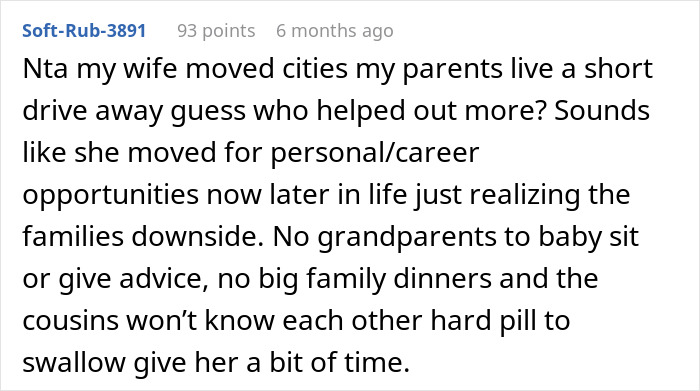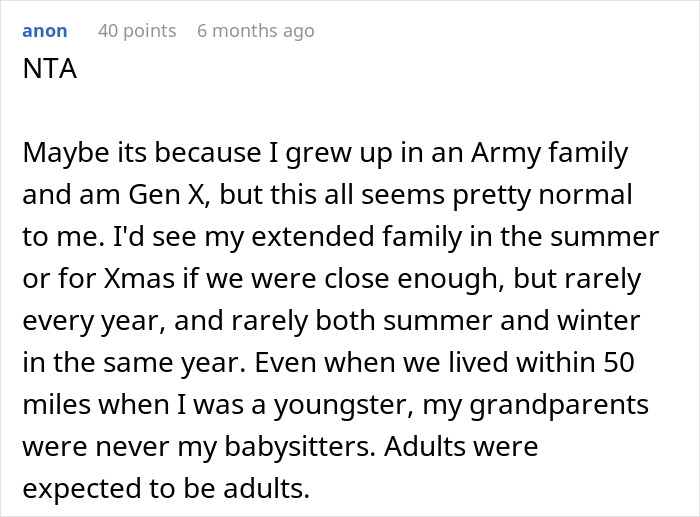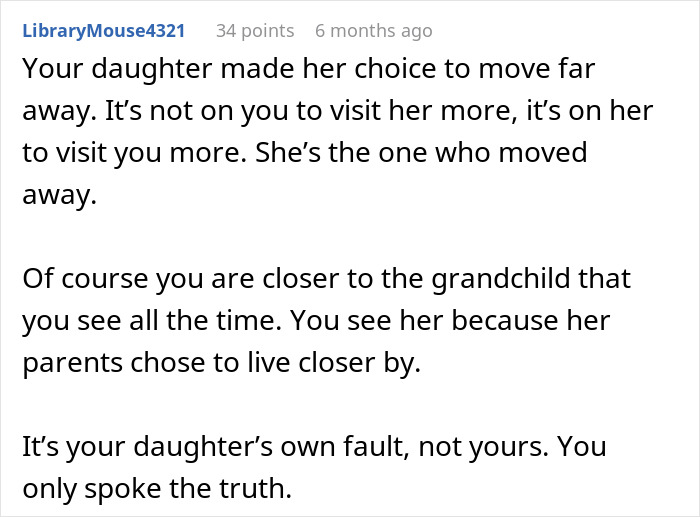Let’s be honest: being a mom is like being the manager of a team that never agrees on the game plan. You’ll give 110%, stay up nights, juggle feelings like a circus clown, and someone will still say you’re not doing enough.
This is the exact emotional tightrope today’s Original Poster (OP) found herself walking. She has two daughters: one who lives across the country, and another one who lives just down the street. While she has tried to be equally supportive to both, one now feels she’s getting short-changed on emotional labor and physical presence. But is it really favoritism, or just geography playing dirty?
More info: Reddit
There’s something deeply disheartening about giving your all to someone you love, only to feel like it’s never quite enough

Image credits: luizph / Pexels (not the actual photo)
The author has two daughters with the older one living across the country and the younger one living just down the street





Image credit: Ok_Maybe_3830

Image credits: Adrienn / Pexels (not the actual photo)
She couldn’t always be physically present for her older daughter due to the cost of traveling, but she puts in a lot of effort to be present, and the daughter loves their closeness





Image credit: Ok_Maybe_3830

Image credits: Alex Green / Pexels (not the actual photo)
However, she spends more time with her younger daughter and her family because they live closer to each other






Image credit: Ok_Maybe_3830
After a weekend where they all spent time together, the older daughter accused the author of preferring her younger sister to her
The OP’s older daughter flew the nest years ago, chasing her dreams to the other side of the country; the mom has tried to be present for all the major life events like wedding dress shopping and the birth of her grandson, but had to rely on FaceTime and sporadic visits due to work commitments and financial limitations.
Despite the distance, the daughter often expressed gratitude for their bond. The OP’s younger daughter, on the other hand, chose a path closer to home. Literally. Since she lives just a few houses down, the OP has been able to be there for all the moments from wedding planning, baby showers, to date-night babysitting.
The older daughter visited with her family for her sister’s daughter’s first birthday, and the OP took her grandkids on outings, and even got one-on-one time with the older daughter. But after flying home, the daughter went silent for two weeks, and when she finally spoke up, she admitted the visit left her feeling like the OP was more involved with her sister’s family and played favorites with her other grandchild.
Despite the OP’s attempt to explain her limitations and offer creative solutions to stay connected, the older daughter wanted more visits or nothing at all. The OP then made it clear she wasn’t choosing one daughter over the other, she was just doing the best she could with the hand she was dealt.

Image credits: Kaboompics.com / Pexels (not the actual photo)
In this scenario, Bored Panda reached out to clinical psychologist Christabell Madondo for her insight on why the OP might feel underappreciated despite her efforts to stay connected with her daughter. According to Madondo, the mother’s situation reveals underlying family dynamics that can often lead to feelings of resentment.
“When adult children feel less supported or excluded, it can trigger emotions like resentment, anxiety, and insecurity,” she explained. These feelings, she noted, may stem from the child feeling neglected or misunderstood, even if the parent is doing their best.
We followed up by asking how parents can set emotional boundaries without seeming cold or disconnected, especially when trying to maintain a close relationship with their adult children. Madondo suggested, “Using ‘I’ statements to express feelings is crucial to avoid placing blame or pointing fingers.”
She emphasized the importance of showing affection and validating the child’s emotions while acknowledging one’s own limitations. “I recommend affirming them, even if physical presence isn’t always possible,” she added.
Finally, we asked how parents can address growing resentment from their children and rebuild trust in the relationship, to which she explained that honesty is key, and that parents should approach their child with an open mind.
“Validating the child’s emotions and asking for solutions helps in working toward a compromise,” she advised, and also stressed the importance of patience, acknowledging that rebuilding trust takes time and effort from both sides.
Netizens supported the OP, stating that the older daughter’s expectations were unfair, given it was her decision to move far away. Others applauded the OP for making efforts, but insisted that her daughter would have to make efforts, too.
What do you think about this situation? How do you think the OP should have handled her daughter’s accusations? Should she try harder to visit more, or should she stick to her current efforts? We would love to hear your thoughts!
Netizens applauded her for putting effort into maintaining a close relationship with the older daughter, but insisted it was time for her to reciprocate it

















